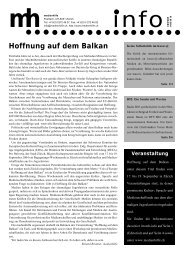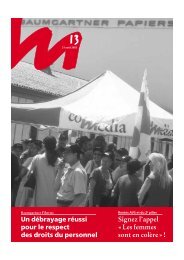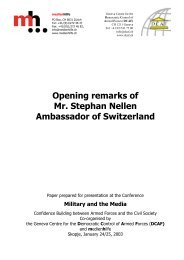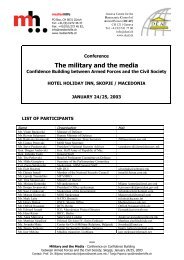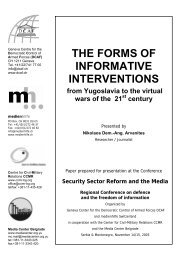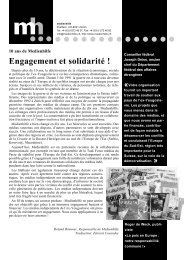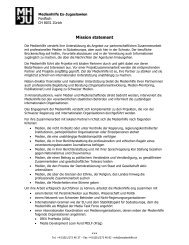The Impact of Media Concentration on Professional ... - OSCE
The Impact of Media Concentration on Professional ... - OSCE
The Impact of Media Concentration on Professional ... - OSCE
Create successful ePaper yourself
Turn your PDF publications into a flip-book with our unique Google optimized e-Paper software.
een going from bad to worse. Working an 80 hour weekis no excepti<strong>on</strong>, wages are in free fall, and people are hiredand fired at random – these are <str<strong>on</strong>g>of</str<strong>on</strong>g>ten illegal practices butnobody cares. Instead <str<strong>on</strong>g>of</str<strong>on</strong>g> employing experienced journalists,editors-in-chief prefer placement students – because theyare cheaper. I know people who have been told <strong>on</strong> a Thursdaynight in April that they need not come back <strong>on</strong> M<strong>on</strong>day– although they had a c<strong>on</strong>tract until the end <str<strong>on</strong>g>of</str<strong>on</strong>g> the year.Placement students, who do not know whether Arafatis Palestinian or Jewish, edit the news about the peaceprocess in the Middle East ...As I see it, this is a return to brutal early capitalism,when the small people depended completely <strong>on</strong> the mercy<str<strong>on</strong>g>of</str<strong>on</strong>g> the big bosses. It is a danger to democracy – and thedestructi<strong>on</strong> <str<strong>on</strong>g>of</str<strong>on</strong>g> a pr<str<strong>on</strong>g>of</str<strong>on</strong>g>essi<strong>on</strong>. I pers<strong>on</strong>ally do not know anyTV journalists who still love their job. Most want to leave.”An<strong>on</strong>ymous German JournalistIn additi<strong>on</strong>, this study does not ignore that foreign investmentis not limited to the respective country’s print media. <str<strong>on</strong>g>The</str<strong>on</strong>g>re arevarious degrees <str<strong>on</strong>g>of</str<strong>on</strong>g> cross-ownership between print media andelectr<strong>on</strong>ic media. In Germany, for example, local and regi<strong>on</strong>aldaily newspaper publishing houses are very much linked toregi<strong>on</strong>al commercial radio stati<strong>on</strong>s, whereas Lithuania wasreported to have a rather distinct differentiati<strong>on</strong> between theowners <str<strong>on</strong>g>of</str<strong>on</strong>g> newspapers and electr<strong>on</strong>ic media. But while in Lithuaniavirtually all TV stati<strong>on</strong>s are owned by foreign capital, the TVlandscape in Germany is to a large extent in the hands <str<strong>on</strong>g>of</str<strong>on</strong>g> Germancompanies. In Romania a lot <str<strong>on</strong>g>of</str<strong>on</strong>g> vertical cross-ownership canbe seen: the same company owns TV programmes, radio stati<strong>on</strong>s,newspapers and magazines, printing plants and distributi<strong>on</strong>networks. <str<strong>on</strong>g>The</str<strong>on</strong>g>n again, this phenomen<strong>on</strong> <str<strong>on</strong>g>of</str<strong>on</strong>g> vertical c<strong>on</strong>centrati<strong>on</strong>is not a Romanian peculiarity.This is to say that the results <str<strong>on</strong>g>of</str<strong>on</strong>g> this study mainly reflectanswers from journalists from dailies, but that the trends shownTHE SURVEY 69



